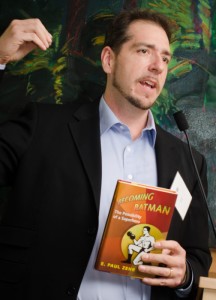Batman: whether through the live-action films, the comics, or the animated shows, almost everyone knows about the Dark Knight, and just saying the word immediately conjures up an image in most people’s minds. This is the reason that three experts from different fields will be coming together for An Evening with Batman’s Brain, a night at the University of Victoria that will feature talks about psychology, philosophy, and neuroscience, all using Batman as their main subject.
“Basically we’re bringing together three different perspectives around the brain and the mind to talk about Batman,” says E. Paul Zehr, a professor of kinesiology and neuroscience at UVic, as well as the author of several books. “We have a psychologist coming from Arkansas, a guy named Travis Langley, who wrote a book a while ago called Batman and Psychology. We’ve got a guy coming from New York, at the College of Staten Island, named Mark White, who wrote a chapter in, and edited, a book called Batman and Philosophy, and has written all kinds of other things. And my contribution is neuroscience.”
The setup allows the three to do a Comic-Con style panel, with people talking about the different aspects of Batman and his brain from the perspective of psychology, philosophy, and neuroscience. Zehr says he’ll be focusing on some of the things from one of his books, Batman: The Possibility of a Super Hero.

“Batman, to me, represents an example of sort of the peak conditioning of a human body and brain to get to the highest level of performance that we can achieve. It works as a metaphor for thinking about what is really possible for a human being to do with training, diet, and whatever genetic disposition they already have,” says Zehr. “We think about Batman, all the athleticism, the martial arts abilities, the determination; let’s look at what of that character is realizable, what of that could you do, if any.”
But Zehr says that whether or not you could do it is not the main issue, because, with the scope of all of the things he does, actually becoming Batman is impossible. What’s more important are the parts of the Batman mythology based around determination, hard work, and tenacity leading to achievement. The ability to convey these ideas is exactly why Zehr chooses to use Batman as his vehicle of education.
“Batman is a great metaphor, and it’s important as a university professor, where you are accumulating lots of knowledge, because sometimes stuff gets lost from the general public,” says Zehr. “We don’t have to have some special terminology about something; we can now talk in the context of Batman.”
Zehr argues that if two people are able to conjure up the same idea in their heads—in this case, the Caped Crusader—then they will be able to talk about all different types of topics. He says this will be very important to education going forward.
“I’m trying to use pop culture as a bridge between scientific knowledge and the general public,” says Zehr. “I’m not saying you need to use superheroes, necessarily; use something you like, but also something that’s popular so that half your job of getting people interested is already taken care of before you talk about the main message.”
An Evening with Batman’s Brain
7 pm Wednesday, March 16
Free, but tickets must be reserved
UVic Farquhar Auditorium
tickets.uvic.ca
